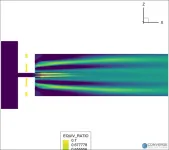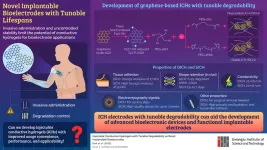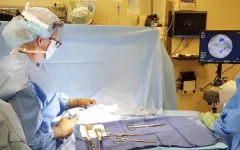Cancer immunotherapy has transformed the treatment of many types of cancer. Yet, for reasons that remain poorly understood, not all patients get the same benefit from these powerful therapies.
One potent factor in treatment outcome appears to be an individual’s gut microbiota — the trillions of microorganisms that live in the human intestine — according to new research led by investigators at Harvard Medical School and Dana-Farber Cancer Institute.
The study, done in mice and published May 3 in Nature, pinpoints how gut microbes enhance the body’s response to a common type of immunotherapy known as PD-1 checkpoint blockade, currently used for the treatment of 25 forms of cancer.
The research found that specific gut bacteria can affect the activity of two immune molecules — PD-L2 and RGMb — as well as the interplay between them.
The work also showed that blocking the activity of either molecule or the interplay between them enhanced responses to cancer immunotherapy and optimized the body’s ability to detect and destroy cancer cells.
“The engagement between PD-L2 and RGMb acts as a brake on cancer-fighting T cells, and our work shows that treatment with antibodies that block the interaction of PD-L2 with RGMb releases this brake and allows T cells to eradicate tumors,” said co-senior author Arlene Sharpe, the Kolokotrones University Professor at Harvard and chair of the Department of Immunology in the Blavatnik Institute at HMS.
Sharpe co-led the research with Dennis Kasper, the William Ellery Channing Professor of Medicine and professor of immunology at HMS, and Gordon Freeman, professor of medicine at HMS and Dana-Farber.
The study also identifies the molecule RGMb as a previously unknown accomplice in sabotaging the body’s ability to spot and destroy tumors. RGMb, primarily known for its role in nervous system development, is also found on the surface of cancer-fighting T cells. Until now, however, no one knew it played a role in regulating T-cell responses to cancer immunotherapy.
If replicated in humans, the findings can inform the design of therapies that improve immunotherapy treatment outcomes, the researchers noted.
“Our findings offer a critical clue into a complex puzzle and in doing so suggest concrete ways to enhance the potency of cancer immunotherapy and improve patient outcomes,” said study co-first author Joon Seok Park, a postdoctoral research fellow in immunology in the Sharpe lab. “We propose a new approach to overcome the resistance to the current cancer immunotherapies by learning from gut bacteria that help our immune system to fight cancer.”
How cancer evades immune detection and destruction
Critical to cancer’s survival and spread is its ability to evade the body’s immune defenses. Starting in the 1990s, Sharpe and Freeman performed some of the critical early work that elucidated how cancer manages to do so.
Sharpe’s and Freeman’s work focused on two molecules, PD-L1 and PD-L2, that reside on the surface of immune cells. Their research showed that when PD-L1 or PD-L2 interact with another molecule, PD-1, on the surface of T cells, the activity of T cells is kept in check. Under normal conditions, this interaction functions as a brake on T cells to ensure they do not mistakenly attack the body’s own cells and tissues.
Sharpe, Freeman, and others discovered that cancer exploits precisely this safety mechanism to evade detection and destruction by T cells. Cancer cells do so by expressing PD-L1 and PD-L2 on their surfaces, engaging with PD-1 and reining in T cells. Cancer immunotherapies that block the interaction of PD-1 with PD-L1 or PD-L2 release the T cells’ attack against cancer and are known as immune checkpoint blockade.
Such treatments, currently used for 25 forms of cancer, have revolutionized cancer care, but a subset of patients do not benefit from them. Since the advent of these treatments, researchers have been trying to understand why.
The interplay between the immune system and the gut microbiota has been the focus of Kasper’s work for many years. His lab has identified not only mechanisms of regulation but also specific microbial molecules and microbial enzymes responsible for modulating the immune system.
The notion that gut microbes could affect cancer immunotherapy is not entirely new. Recent studies have found tantalizing clues about the role that gut microbes play in immunotherapy treatment outcomes. Until now, however, a critical question remained unanswered: How?
A new player enters the scene
In the new study, the researchers used mice whose colons were seeded with gut microbiota from patients with cancer. Some of those patients had responded well to immunotherapy, while others had not experienced much benefit. These animals’ response to immunotherapy mimicked the treatment response in the humans whose gut microbes now lived in their intestines.
Comparing the immune system profiles of the two groups of mice, the researchers identified telltale differences in various immune cells involved in cancer detection and destruction. The finding suggested that gut microbiota altered the immune cells’ behavior and, therefore, response to immunotherapy.
Mice seeded with gut microbes from patients that had themselves responded well to cancer immunotherapy had lower levels of PD-L2 on a class of immune cells known as antigen-presenting cells. These cells play a critical role in rallying the body’s immune defenses. They do so by patrolling the body for pathogens or tumors and presenting these foreign or abnormal proteins to T cells for destruction. Conversely, mice seeded with gut microbes from patients with a poor response to immunotherapy had increased levels of the PD-L2 molecule.
To tease out the effect of specific gut microbes, the researchers treated groups of mice with broad-spectrum antibiotics, which kill gut bacteria. Antibiotic-treated mice did not respond to immunotherapy that blocked the PD-1 molecule. These mice, however, had high levels of PD-L2, the other molecular brake that typically acts through PD-1. Animals that had a robust response to the same treatment had lower levels of PD-L2.
Intrigued that PD-1 blockade did not work, the researchers hypothesized that PD-L2 acts as a brake on T cells, not through PD-1 alone but through another molecular accomplice. The researchers turned their attention to RGMb, which the Freeman lab had previously shown that RGMb and PD-L2 regulated immune tolerance in lungs.
When the scientists treated the mice that had not responded to anti-PD-1 therapy alone with antibodies that blocked RGMb, these animals experienced both an increase in cancer-fighting T cells and rapid overall improvement.
“The interplay between the microbiota and immune cells in the anticancer response just got clearer, and with the identification of RGMb as PD-L2’s molecular accomplice, we have another target for cancer immunotherapy,” Freeman said.
Further analyses showed that the interaction between RGMb and PD-L2 depended on the composition of gut microbes. The researchers found that certain gut microbes could affect the levels of both molecules.
Mice with cancer whose intestines had been seeded with certain gut microbes had levels of RGMb on their T cells six times lower than animals with microbe-free guts and responded to anti-PD-L1 or anti-PD-1 therapy. In comparison, mice with depleted gut microbiota did not respond to these treatments and had higher levels of RGMb on their T cells, especially on T cells that had infiltrated their tumors.
Likewise, mice whose guts were seeded with microbiota from patients with poor treatment responses also had higher levels of RGMb, a finding suggesting that patients who do not mount a good response to cancer immunotherapy harbor higher levels of RGMb on their T cells, which in turn interferes with their immune cells’ antitumor response.
Disabling the activity of either PD-L2 or RGMb was sufficient to preserve T cells’ antitumor activity and ensured a robust response to PD-L1 and PD-1 therapy. Remarkably, blocking the activity of PD-L2 led to a potent antitumor response in animals treated with another form of cancer immunotherapy known as dendritic cell therapy. The observation suggests that modulating PD-L2 activity holds promise for boosting the response to multiple types of cancer immunotherapy.
Gut microbes as regulators of immune response
Altering the composition of the gut microbiota in different groups of mice revealed that one organism, C. cateniformis, suppressed PD-L2 levels and rendered immunotherapy more effective in mice with cancer.
Given that the human gut is home to thousands of bacterial species, this microbe is probably not the only organism capable of regulating antitumor immunity, the researchers said.
The finding suggests that specific microbial molecules can be harnessed in the form of small-molecule drugs to augment the immune system’s ability to control cancer. Such treatments could supplement or be an alternative to traditional antibody-based cancer immunotherapy.
A small-molecule approach would have the added appeal of being cheaper to develop and store and easier to deliver into the body, Sharpe noted. Small-molecule medicines are generally given as pills, while cancer immunotherapy is administered in the form of intravenously infused antibodies.
The researchers caution that while their work reveals a critical piece of the puzzle, it is likely only one of several ways in which the immune system and the microbiome interact in cancer.
“This is likely only the beginning of the story,” said Francesca Gazzaniga, co-first author on the study and a former postdoctoral researcher in the Kasper lab, now assistant professor of pathology at HMS and principal investigator at Massachusetts General Hospital. “Cancer, the immune system, and the microbiome are astoundingly complex individually, but when you put these systems together, the resulting interplay is exponentially more intricate.”
“There are likely many other ways in which the microbiome can affect cancer immunity in general and cancer immunotherapy in particular,” Kasper said. “With this work, we’ve found a whole new way of looking at how the gut microbiota affects not only the efficacy of cancer treatments but cancer immunity in general.”
Authorship, funding, disclosures
Co-authors included Meng Wu, Amalia Luthens, Jacob Gillis, Wen Zheng, and Martin LaFleur of HMS; Sarah Johnson, Golnaz Morad, Elizabeth Park, Yifan Zhou, Stephanie Watowich, and Jennifer Wargo of the University of Texas MD Anderson Cancer Center.
The work was supported by funding from Quark Ventures (grant A31696), National Institutes of Health (grants T32HD55148-10, F32CA247072-02, P50CA206963, P50CA101942, P01 AI56299, and 1F32CA260769-01), and CPRIT Training Award RP210028.
Park, Freeman, Kasper, and Sharpe are listed as inventors on a US utility application (17/311,587) covering identification of gut bacteria that promote an antitumor response to immunotherapy filed by President and Fellows of Harvard College.
Park, Freeman, Kasper, and Sharpe are listed as inventors on US utility application (17/473,083) covering methods and compositions for treating cancer or a tumor in a subject by administering to the subject a first agent that disrupts the interaction between PDL2/RGMb and a second agent that disrupts the interaction between PD-1/PD-L1 filed by President and Fellows of Harvard College.
Park, Gazzaniga, Freeman, Kasper, and Sharpe are listed as inventors on PCT patent applications (PCT/US21/50674) covering methods of treating an individual that has failed an anti-PD-1/PD-L1 therapy filed by President and Fellows of Harvard College and Dana-Farber Cancer Institute.
Park, Gazzaniga, Freeman, Kasper and Sharpe are listed as inventors on PCT patent applications (PCT/US23/12139) covering methods and compositions for treating cancer or a tumor in a subject by administering to the subject T cells with reduced RGMb expression or activity and an immune checkpoint inhibitor such as a PD-1 or PD-L1 inhibitor filed by President and Fellows of Harvard College and Dana-Farber Cancer Institute.
Park, Gazzaniga, Freeman, Kasper, and Sharpe are listed as inventors on a provisional patent application covering PD-L2 modulated dendritic cell therapy filed by President and Fellows of Harvard College and Dana-Farber Cancer Institute.
Freeman is listed as an inventor on US patent US11220545 on combination RGMb and PD-1 blockade for cancer immunotherapy assigned to Dana-Farber Cancer Institute.
Freeman and Sharpe have patents/pending royalties on the PD-1–PD-L1 pathway from Roche, Merck MSD, Bristol Myers Squibb, Merck KGA, Boehringer-Ingelheim, AstraZeneca, Dako, Leica, Mayo Clinic, and Novartis.
Freeman has a patent on RGMb in cancer immunotherapy. Freeman has served on advisory boards for Roche, Bristol Myers Squibb, Xios, Origimed, Triursus, iTeos, NextPoint, IgM, Jubilant, Trillium, GV20, IOME, and Geode. Freeman has equity in Nextpoint, Triursus, Xios, iTeos, IgM, Trillium, Invaria, GV20, and Geode.
Sharpe has patents/pending royalties on the PD-1 pathway from Roche and Novartis. She is on advisory boards for SurfaceOncology, SQZ Biotechnologies, Elpiscience, Selecta, Bicara and Monopteros, Bicara, Fibrogen,IOMEand Alixia. She also is on scientific advisory boards for the Massachusetts General Cancer Center, Program in Cellular and Molecular Medicine at Boston Children’s Hospital, the Human Oncology and Pathogenesis Program at Memorial Sloan Kettering Cancer Center, Bloomberg-Kimmel Institute for Cancer Immunotherapy, GlaxoSmithKline, and Janssen and Amgen. She is an academic editor for the Journal of Experimental Medicine, and has received research funding from Novartis, Roche, UCB, Ipsen, Merck, AbbVie, Moderna, Vertex, and Erasca unrelated to this project.
Kasper is on a scientific advisory board of IOME.
Watowich is on the advisory board for Asylia Therapeutics and reports compensation from Ridgeline Therapeutics.
Wargo reports compensation for speaker’s bureau and honoraria from Imedex, Dava Oncology, Omniprex, Illumina, Gilead, PeerView, Physician Education Resource, MedImmune, and Bristol Myers Squibb and serves as a consultant and advisory board member for Roche/Genentech, Novartis, AstraZeneca, GlaxoSmithKline, Bristol Myers Squibb, Merck, Micronoma, and Biothera Pharmaceuticals, with stock options for Micronoma.
END





